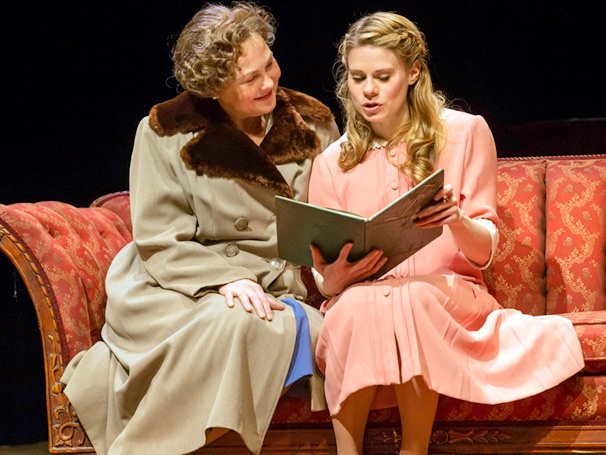In his opening monologue in The Glass Menagerie, Tom says, “This play is memory...I give you truth in the pleasant guise of illusion.” Keep that in mind.
The eclectic staging of John Tiffany’s production is a reflection of Tom's memories of 1937 living in the Wingfield home: a stylized fire escape reaching toward infinity, spaces without walls or ceiling, a black pool with a sliver of moon, choreographed misty movements and the sound of wind chimes. Just one delicate glass unicorn rather than a menagerie is enough to symbolize the fragility of young Laura's spirit as well as the impoverished Wingfield family.
Suddenly, Tom stumbles backward and it is 1937. A few living room pieces appear and magically, so does his sister Laura. The Glass Menagerie at the Booth Theater, directed by John Tiffany (Once) is a quintessential interpretation of Tennessee Williams' classic.
With the illusion, however, there is the harsh reality of the Depression era in St. Louis where the Wingfields have struggled through bad times since the father left. Once a Southern belle, Amanda Wingfield (Cherry Jones) was left with two children to raise, admitting she made a poor choice in husbands when she married, "a telephone man who fell in love with long-distance." Her son, Tom, a restless. aspiring writer played by Zachary Quinto (Star Trek films), works in a shoe warehouse to support the family. While he prowls the night, escaping and searching, his mother wonders what he is doing and comments, "I think you’re doing things you’re ashamed of.”
Quinto plays Tom with well-layered moments of humor, bursts of frustration and plenty of secrets. His long face reflects ambivalence and the burden of responsibility, especially a concern and love for his younger sister, Laura, crippled physically and emotionally. Her limp is less crippling than her reluctance to move outside of herself and the familiarity of her home. Blooming in the role of the fragile Laura, Celia Keenan-Bolger (The 25th Annual Putnam County Spelling Bee) is restrained with timidity and fear. One distressing segment shows Laura's agony when she is about to greet the "gentleman caller," yet Keenan-Bolger also mirrors Laura's moments of happiness.
Cherry Jones (Doubt) is radiant and commanding as Amanda, not the familiar neurotic Southern belle but a survivor of life's challenges by relishing the romantic memories of her youth when her home was filled with "gentlemen callers." Despite her internal escapades into the past, she remains fiercely focused on practicalities about her children's futures. Worried about Laura's disabilities, Amanda sees marriage as the only hope for her daughter's future and hounds Tom to find a suitable young gentleman caller for his sister. He finally relents and brings home a co-worker, Jim, from the warehouse. Brian J. Smith as Jim gives "the gentleman caller" a persuasive decency and likeability that touches Laura and for a brief moment, she senses promise, radiating like her delicate glass unicorn.
When a romance is not to be, it is not only Laura but the entire Wingfield family that is shattered with explosions of repressed frustration and acrimony between Tom and his mother as Laura huddles back into herself. Tom finally leaves the apartment, but his guilt of abandoning his mother and sister haunt him forever.
The refined movements by choreographer Steven Hoggett (Once), like setting the dinner table, enhance the misty memories. Bob Crowley designed the spare set and the costumes, evocative of the 1930's with one exception, Amanda's "special" dress when the gentleman comes calling. Natasha Katz's lighting and Clive Goodwin's sound effects add to the dreamy aura, but the black pool, unless you know about it, is difficult for many in the audience to see.
It can be tempting to concentrate on searching for the symbols in The Glass Menagerie - the glass figurine, the black pool, the enigma of Tom's night prowls, finding the similarities between disabled Laura and Tennessee Williams' other female characters. Are all his frail Southern ladies inspired by his sister, Rose? Is Tom, like the playwright, gay? Resist the temptation and allow the flow of this family to absorb you.
With Williams' rich poetic writing and Tiffany's incisive direction, these actors invest Amanda, Laura, Tom and "the gentleman caller" with flawless perception. Let the graceful mix of fantasy and reality, as simple as it is complex, captivate you and break your heart. Theater like this does not come along very often.

